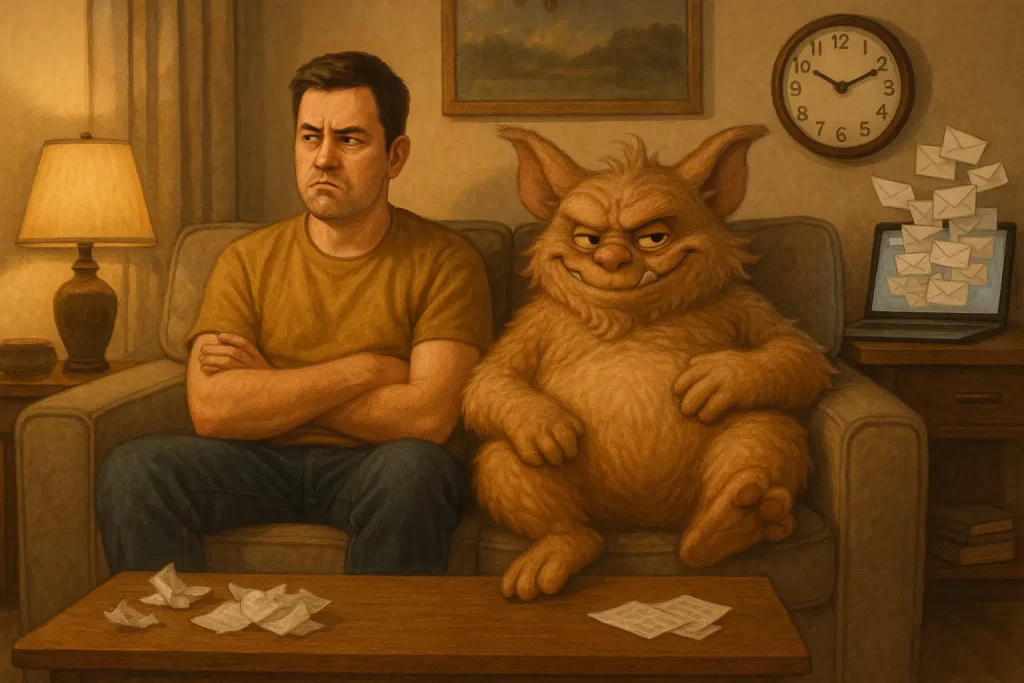By Michael Mooney, Exec. Elder
There was a man who discovered a strange creature. He kept it as a pet. Not knowing what to call it, he named it “Peeve”. The two became fond of each other, almost like the friendship of a trusted dog. He told Peeve stories, especially the ones where he was in frustrating circumstances.
Peeve, it seemed, thrived on these stories. His ears perked when the man described long checkout lines, slow drivers in fast lanes, or people who spoke with food in their mouths. Peeve would chirp, wag, or sometimes mimic the man’s own expressions of exasperation.
Over time, the man noticed something strange. Peeve grew.
What once fit in a teacup now needed a chair. Then a couch. Then a room.
The more the man vented, the larger Peeve became. He found himself rearranging his life to accommodate the creature. Friends visited less. The house echoed less with laughter, more with muttering. Peeve didn’t mind. He liked the attention. He loved the stories. Especially the ones with a sigh at the end.
Then one day, the man tried to leave for a walk, just to get some fresh air. But Peeve blocked the door.
The man laughed nervously. “Come on, Peeve. I’ll be right back.”
But Peeve didn’t move. His eyes (once bright with silly affection were now narrowed). He let out a low, rumbling grunt that sounded like a thousand unsaid complaints.
The man stepped back. That’s when he noticed the trail of claw marks across the doorframe. When had those appeared?
He sighed, turning instead to the couch. Peeve purred, curling beside him, immense and satisfied. The man reached for a book, but Peeve nuzzled it away, nudging a worn photo album into his lap instead. Memories of canceled plans, annoying coworkers, passive-aggressive emails.
“I suppose we could talk a bit more,” the man mumbled. And so he did.
But that night, as he tried to sleep, he found himself curled in a corner of his bed while Peeve sprawled across the rest snoring and smug.
That’s when the man began to wonder: had he adopted Peeve… or had Peeve adopted him?
In the quiet hours before dawn, the man lay awake, watching the shadows Peeve cast on the wall. He remembered when Peeve was small and harmless, even amusing. But now, Peeve had grown large enough to shape his day, color his moods, even guard his heart.
So the man whispered a question into the dark: “What would happen… if I stopped feeding you?”
Peeve’s ears twitched. But the man said nothing more. He closed his eyes, held his tongue, and let silence do what stories could not.
The next morning, Peeve was smaller!
Not gone, no. Just… reduced. Less room taken. Less noise made.
And so the man learned: pet peeves, like pets, grow when fed. But unlike real friends, they offer no comfort; only company in bitterness.
He still kept Peeve, but in a small cage by the door. Some days, he let Peeve out. But more often, he nodded politely, walked past, and chose joy instead.
Why Pet Peeves Make Poor Pets
Pet peeves feel familiar. We cradle them, feed them our frustrations, and even let them comfort us when life feels out of control. But unlike faithful animals, these pets don’t love us. They tether us. They feed on our grievances and grow fat on our attention. They turn minor annoyances into companions we defend rather than evict.
Jesus said, “Out of the abundance of the heart the mouth speaks” (Matthew 12:34). If the heart grows crowded with irritations, our words, and soon our actions will follow. Bitterness, once adopted, rarely stays small.
Paul exhorts us to “Let all bitterness and wrath and anger and clamor and slander be put away from you, along with all malice” (Ephesians 4:31). These aren’t just bad habits; they are poor companions for the soul. When indulged, they take up space meant for grace.
The fruit of the Spirit: love, joy, peace, patience, kindness, goodness, faithfulness, gentleness, self-control (Galatians 5:22–23),can’t grow in a heart overrun by pet peeves. One chokes the other.
Jesus didn’t carry pet peeves. He carried a cross. And from it, He said, “Father, forgive them” (Luke 23:34), not “Father, do you see what they did to me?”
So release your grievances from the leash. Don’t let them nest in your soul.
They were never meant to be pets. They were meant to be laid at the feet of Jesus!
If you would like to use this story, please use the following citation:
Mooney, M. (2025, May 23). Why pet peeves make poor pets: A modern parable for Today. NACM Manual to Ministry. https://ministry-tools.nacministers.org/docs/analogies/pet-peeves-make-poor-pets/





